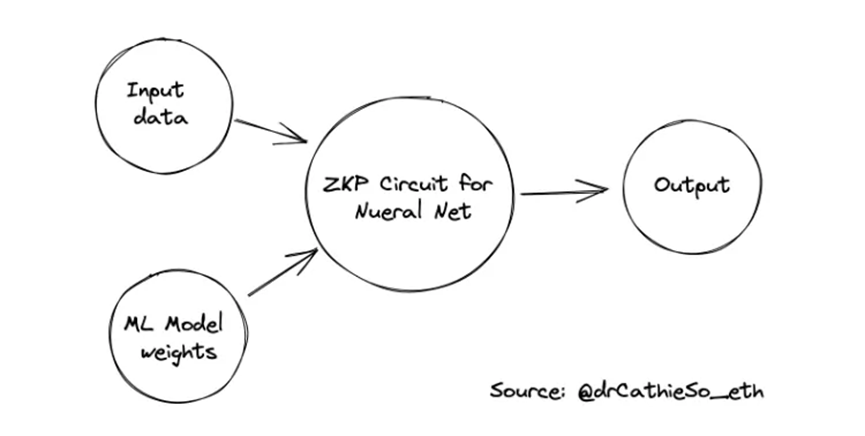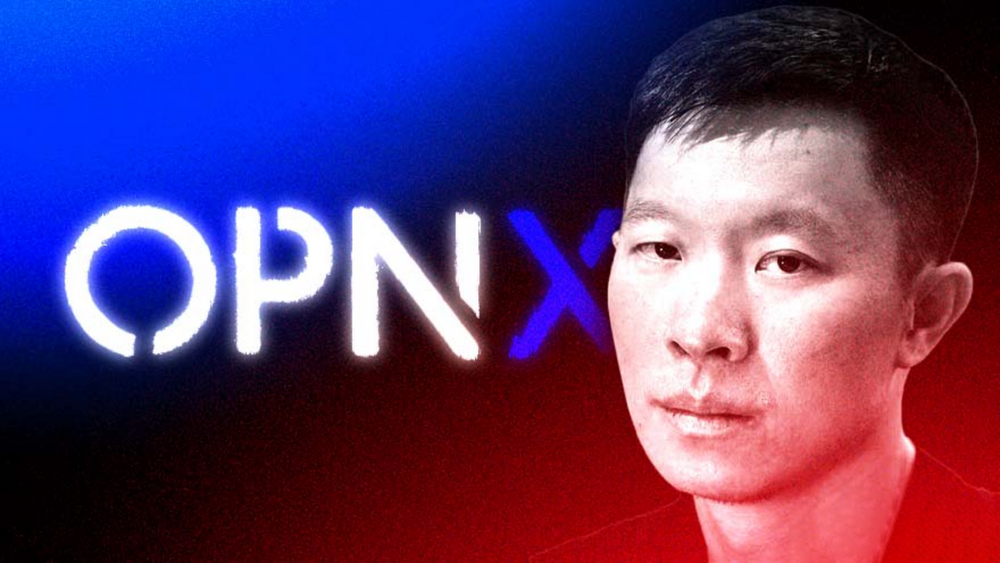A glimpse of the emerging new use cases for ZK: zkML, ZK Games, ZK ID
New use cases for ZK: zkML, ZK Games, ZK IDAuthor: zkvalidator; Compiled by: Kate, Marsbit
In this article, we will explore emerging use cases for ZK.
Introduction
Over the past few months, we have witnessed a lot of hype around zero-knowledge use cases, including zkevm, zkBridges, and more. However, in such a fast-paced environment, new use cases are emerging, with zero-knowledge proofs (ZKPs) playing a crucial role. This article aims to explore areas where ZKPs are gaining more attention in the minds of individuals.
ZKML Zero-Knowledge Machine Learning

- Decoding the DEX newcomer Vertex: average daily trading volume of about 40 million US dollars in the past 7 days, with a daily trading volume market share of about 10%.
- Can ERC’s Finalize establish its orthodox status?
- Inverse Finance: A Rebirth from the Brink of Death?
This chart shows how zkML works
ZKML (Zero-Knowledge Machine Learning) is a nascent technology with tremendous potential in various applications that has yet to be fully developed. From computing integrity and privacy protection to the transparency of machine learning as a service and decentralized inference or training, ZKML opens up new doors for innovation. Here are some potential use cases for ZKML:
Verifiability in ZKML: ZKML uses validity proofs such as SNARKs and STARKs to ensure accurate execution of computations, particularly in machine learning. With these proofs, machine learning model inferences can be verified, confirming the sources of outputs given certain inputs. This feature enables machine learning models to be deployed off-chain while conveniently verifying ZK proofs on-chain.
Privacy protection in ZKML: Privacy is a key issue in machine learning, and ZKML provides a solution. It can prove the accuracy of a model on test data without revealing the weights used, ensuring data privacy. Furthermore, ZKML facilitates privacy-preserving inference, allowing sensitive medical diagnoses, such as cancer detection results, to be shared with patients without leaking their data to third parties.
Enhancing transparency in Machine Learning as a Service (MLaaS): ZKML plays a crucial role in enhancing transparency in Machine Learning as a Service. By providing validity proofs associated with machine learning model APIs, users can verify the authenticity of the models they are using. This solves the problem associated with traditional APIs (which are often seen as black boxes) and increases trust in the models provided.
Decentralized reasoning and training: ZKML enables decentralized execution of machine learning tasks. The model allows for public participation and data submission during inference or training by utilizing zero-knowledge proofs for compression. This opens up new avenues for collaboration and distributed machine learning.
ZKML Proof: Proof is an important aspect of ZKML, allowing verifiable proofs to be merged from trusted external sources. By using zero-knowledge proofs to verify digital signatures from trusted sources, ZKML ensures the authenticity and source of the proven information. This allows for trusted references to be verified and used in a variety of applications.
Application of ZK in games
Zero-knowledge proof (Zero Knowledge Proofs, or ZKP) offers many advantages for game architecture and gaming experience. By integrating ZKP, game developers can benefit from reduced costs, enhanced privacy protection, effective anti-cheating measures, and improved scalability.
In terms of game architecture, ZKP has a significant impact on online multiplayer games by minimizing sensitive data stored on centralized servers, lowering the cost of maintaining client-server architecture. Additionally, ZKP enhances the privacy and security of peer-to-peer (P2P) game systems, eliminating the need for expensive servers while ensuring the authenticity of in-game events and preventing cheating.
ZKP also addresses the scalability challenge of gaming by reducing server overhead in client-server architecture and enabling verifiable game operation proof in P2P multiplayer games. This expands the number of concurrent players supported, provides a more enjoyable gaming experience, and attracts a wider range of players.
In terms of gameplay, ZKP provides solutions for various types of games. In first-person shooter (FPS) games, ZKP can verify a player’s skill level without revealing sensitive information, thereby improving match accuracy. In massive multiplayer online role-playing games (MMORPGs), ZKP can secure ownership and exchange of virtual assets, creating a unified economy across different games. ZKP is also applied in gambling and casino games, providing verifiable random results and protecting player privacy. Additionally, ZKP can ensure a player’s progress and high scores in puzzle and strategy games while maintaining the privacy of sensitive information.
Using ZKP in the gaming industry can enhance the gaming experience, increase player retention, and obtain higher revenue. As the use of ZKP continues to expand, specialized hardware may become crucial to meet the growing computational demands.
ZK ID – Decentralized ID
Establishing digital trust and secure identity verification is crucial in today’s network environment. The emergence of Zero-Knowledge Proofs (ZKP) has revolutionized this field by providing higher privacy and security. Here, we explore the properties and advantages of zero-knowledge proofs, as well as their potential to redefine digital identity verification.
-
Enhanced privacy protection: ZKP excels in protecting sensitive information. Users can verify their identity or credentials without revealing specific details such as their ID number or address. ZKP establishes a secure framework that allows for trustless interactions while maintaining confidentiality.
-
Secure and verifiable interactions: ZKP enables users to participate in smart contracts and verify information on the blockchain while hiding their private data. Off-chain credentials such as passports or educational degrees can generate zero-knowledge proofs. These proofs can then be used for trustless verification on the blockchain, ensuring data integrity and maintaining privacy.
Recently, Polygon launched Polygon ID, a zero-knowledge decentralized identity solution. Polygon ID harnesses the power of zero-knowledge proofs, allowing users to verify their identity without revealing sensitive information. It provides a comprehensive toolkit, including a verifier SDK, issuer nodes, wallet SDK, and wallet applications, enabling developers to seamlessly integrate decentralized identity solutions into their applications.
Conclusion
In conclusion, the diversity of areas with positive impacts from ZK indicates the potential for widespread adoption of this technology in the blockchain industry. Indeed, most of these applications – zkML, ZK games, ZK ID – are still in their infancy, and some remain largely theoretical. Nevertheless, we anticipate vibrant ZK-based application ecosystems emerging from these areas as they mature, redefining our notions of privacy, security, and verifiability.
We will continue to update Blocking; if you have any questions or suggestions, please contact us!
Was this article helpful?
93 out of 132 found this helpful
Related articles
- “The Three Pain Points” of Digital Asset Trading
- Multichain crisis reappears as over $130 million in token liquidity is withdrawn
- Why Frax Finance is worth watching: Three investment themes, five catalysts
- Multiple bridge contracts operated by Multichain have experienced large-scale abnormal outflows of various tokens, with a total value exceeding 130 million US dollars.
- Vertex: Derivative DEX rookie, with a market share of about 10% in daily trading volume in Japan.
- The Battle for Hong Kong Dollar Stablecoin: Government Issued VS Private Issued
- Multichain crisis resurfaces, with over $130 million in token liquidity withdrawn.






